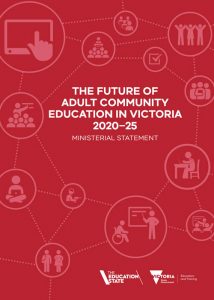May 2020
In this issue
1. From The President
2. Adult Literacy needs in 2020
- Adult LN needs are exacerbated by the COVID-19 event
- ACAL brainstorm session – What are the needs of adult literacy teachers in social isolation and post isolation?
3. Professional development
- The LLN and VET Meeting Place is back
- Register now for #NoFrills2020
- ACAL webinar ‘A VOCEDplus primer: focus on adult literacy and numeracy’
4. Have you read this?
- PIAAC and the South: Is Southering the new Othering? Global Expansion of dominant Discourses on Adult Literacy
5. Profiling literacy and numeracy specialists
- Laura Chapman
6. New Adult Literacy and Numeracy Reform in Victoria
7. Foundation Skills for your Future program
8. National Reconciliation Week
1. From The President

The importance of ongoing access to literacy and numeracy support in the coming months as people are re-entering work, adapting to new conditions, requiring retraining, or looking for a way to enter the workforce for the first time will require increased access to LN support. ACAL has been lobbying for LN services now, during the Covid-19 recovery phase, and beyond. As well as work, we have been thinking about the increased need for literacy in different contexts. For example family literacy – there have been many stories of parents attempting home schooling and finding their own LN skills hamper the effort. Another example is health literacy – trying to navigate the health messages and follow the most current messaging. If ever there was a need for critical literacy to wade through the myths and facts it’s now!
The new normal is ever changing and it has not been surprising to adult literacy and numeracy teachers to see learner needs exacerbated. There are increasingly obvious reasons to address adult LN and we have captured some in this newsletter. If you can add to the conversation please do contact us on Facebook or by email as we are interested in hearing about your experiences during this time.
I hope you have time to put your feet up and escape into the world of a good book to ease the stresses and uncertainties of this confronting moment in history. Best wishes to everyone.
Jo Medlin
ACAL President
2. Adult Literacy needs in 2020
 ACAL representatives met in April 2020 to discuss the impact of social isolation on adult literacy and numeracy (LN) learners. The session provided an opportunity to share experiences and reflect.
ACAL representatives met in April 2020 to discuss the impact of social isolation on adult literacy and numeracy (LN) learners. The session provided an opportunity to share experiences and reflect.
What are the literacy needs of adults? We thought about the needs during social isolation, as social isolation eases, and post-Covid19 to future proof society. We considered that this situation has highlighted the need for:
- Health literacy to enable individuals to access, comprehend and use health information
- Family literacy to support learning and development
- Critical thinking skills to sort and evaluate information
- Social literacy for connections and for everyday living
- Civic literacy, such as that required in NT Aboriginal communities for self-governance
- Digital literacy to access educational, personal, social and community information and events
- Financial literacy
- Problem solving skills
- Learning strategies to access, organise, extract, evaluate, use, and store information
Adult LN needs are exacerbated by the COVID-19 event
The issue: Social isolation has resulted in the closure of services and agencies where adults with literacy and numeracy needs find support, such as educational classes, community centres, and libraries.
The impact: There will be a broadening of the socioeconomic divide in society. The issues of social isolation for many adult LN students are exacerbated by:
- Little or inconsistent or no access to technology
- Lack of digital literacy and skills to facilitate internet safety
- Lack of family or social support
- No suitable study space at home
- Cost of internet access
- Lack of reliable internet access e.g. in regional and remote areas
- Modification of resources that are designed to be delivered in a learning environment supported by a face to face teacher or volunteer
- Mental health issues
- Self-esteem issues impacted by difficulties exposed by, for example, assisting children with schoolwork, attempting to access government agencies and other services without support
- Intensified or changed literacy tasks such as increased form filling
The solution: The focus of funded adult literacy and numeracy programs must be widened.
Over the past two decades there has been a national focus on funding literacy and numeracy for economic reasons, such as obtaining work. However, personal, social and community literacy needs have become increasingly important during the Covid19 pandemic for connectivity in isolation and will continue to be required during the transition period and throughout the post Covid19 recovery phase. A greater emphasis on the retraining and support of existing workers will also be required.
ACAL brainstorm session – What are the needs of adult literacy teachers in social isolation and post isolation?
All teachers of adults require development and refinement of skills to support adult learners with LN needs.
Adult LN teachers need:
- Professional development (PD) on teaching content, not compliance
- Scholarships for further study
- PD on assisting with mental health issues
- Opportunities to experiment with alternative modes of delivery and teaching strategies
- Forums to share what has worked
If you would like to contribute to this conversation and share your experiences, please do contact us via email or on our Facebook site.
3. Professional development
The LLN and VET Meeting Place is back
 The LLN and VET Meeting place is a site that provides a resource repository with links to information and practical advice to help adult educators support LLN and foundation skill development through vocational education and training and other adult education contexts. The site is free.
The LLN and VET Meeting place is a site that provides a resource repository with links to information and practical advice to help adult educators support LLN and foundation skill development through vocational education and training and other adult education contexts. The site is free.
The repository has links to resources that cover:
LLN – language literacy and numeracy, plus other foundation skills
VET – Australia’s vocational education and training system.
The site, originally established by Ann Leske and Chemene Sinson, is being reinvigorated by Chemene after receiving feedback from readers who wanted the blog posts and resource repository to continue. Chemene would welcome suggestions for links to new LLN or foundation-skills-related resources that are freely available and that are quality-approved and latest news or ‘how-to’-type posts or articles. If you have suggestions or contributions, Chemen can be contacted via the site.
Register now for #NoFrills2020
 NCVER are taking the 29th National VET Research Conference ‘No Frills’ ONLINE for the first time ever.
NCVER are taking the 29th National VET Research Conference ‘No Frills’ ONLINE for the first time ever.
With a comprehensive range of live and pre-recorded content, including keynote speakers, focus sessions and over 30 presentations, #NoFrills2020 will immerse you in the future of VET.
What’s more, attendees will have access to all of this quality content, plus all the networking opportunities you’d usually expect from a ‘No Frills’ conference, for one low price.
It’s all happening from 7-10 July 2020, so REGISTER NOW.
ACAL webinar ‘A VOCEDplus primer: focus on adult literacy and numeracy’
 This webinar was presented for the Australian Council for Adult Literacy (ACAL) on Wednesday 25 March 2020. The focus was on the aspects of VOCEDplus that can support those working in the field of adult literacy/numeracy/foundation skills. VOCEDplus is NCVER’s free international research database for tertiary education, with extensive coverage of Australian material and a wide range of international information. VOCEDplus also features a variety of ‘value-add’ resources that package information to enable our users to target and access relevant material quickly.
This webinar was presented for the Australian Council for Adult Literacy (ACAL) on Wednesday 25 March 2020. The focus was on the aspects of VOCEDplus that can support those working in the field of adult literacy/numeracy/foundation skills. VOCEDplus is NCVER’s free international research database for tertiary education, with extensive coverage of Australian material and a wide range of international information. VOCEDplus also features a variety of ‘value-add’ resources that package information to enable our users to target and access relevant material quickly.
Examples covered by the webinar included: (1) the Pod Network, in particular the Foundations Skills Pod and the Language, Literacy and Numeracy Podlet; (2) the VET Practitioner Resource, focusing on the Foundation Skills topic of the Teaching, Training and Assessment Resources section of the resource; and (3) the VET Knowledge Bank, notably the Getting to Know VET chart and the Glossary of VET. Other resources highlighted included: the Special Collections, with a focus on the Literacy and Numeracy Resources (Adult Literacy National Project (ALNP); Adult Literacy and Numeracy Australian Research Consortium (ALNARC); Workplace English Language and Literacy (WELL)); and key conferences and journals. The webinar also demonstrated how to get the best from a VOCEDplus search using some examples topical for the ACAL audience.
4. Have you read this?
PIAAC and the South: Is Southering the new Othering? Global Expansion of dominant Discourses on Adult Literacy
by Anke Grotlüsch and Klaus Buddeberg, 2020
 Large-scale studies such as Programme for the International Assessment of Adult Competencies (PIAAC) are currently the most influential variant of literacy research. PIAAC is undergoing a process of regional expansion towards countries located in the geographical south.
Large-scale studies such as Programme for the International Assessment of Adult Competencies (PIAAC) are currently the most influential variant of literacy research. PIAAC is undergoing a process of regional expansion towards countries located in the geographical south.
Based on the finding that large-scale studies can create stereotypes about social groups, this contribution examines the extent to which this danger also exists with regard to countries and regions.
The contribution does not pursue the goal of questioning the legitimacy of international studies. Rather, we would like to point out the necessity of exercising due care in the interpretation of corresponding study results.
5. Profiling literacy and numeracy specialists
In this section we profile LN specialists to demonstrate the range of qualifications and experience that lead to expertise in the field. We encourage all readers to refer to the National Framework as a reminder that the TAELLN411 unit is an awareness unit and is at the start of a journey in LN teaching. For those wishing to extend from awareness to developing teaching skills we encourage shadowing, mentoring and training – several RTOs are currently delivering the TAE80113 Graduate Diploma in LLN Practice and information can be found at training.gov.au
Laura Chapman
Reconnect Facilitator & Volunteer Program Manager, Carringbush Adult Education

Laura Chapman and student Elizabeth Deng
‘I ventured into literacy and numeracy teaching from EAL teaching, but had originally studied fine art with the aim of being an art teacher. I began teaching newly arrived refugees, which opened my eyes to the importance of LLN skills in giving people agency to engage in community activities and access opportunities. The resilience and determination of the students got me hooked! …
At the time there wasn’t much specialist knowledge available for low literacy EAL learners, so I figured things out as I went – to this day I cringe when I think of my early lessons! 19 years later I’m still figuring out this teaching thing!’
6. New Adult Literacy and Numeracy Reform in Victoria
 ACAL welcomes the commitment to adult literacy and numeracy from the Victorian government in the Adult Community Education sector in the form a new reform agenda. Responding to PIAAC data that estimated Victoria has 650,000 adults at the lowest levels of literacy, the Further Opportunities for Adult Learners (FOAL) project was conducted in 2018.
ACAL welcomes the commitment to adult literacy and numeracy from the Victorian government in the Adult Community Education sector in the form a new reform agenda. Responding to PIAAC data that estimated Victoria has 650,000 adults at the lowest levels of literacy, the Further Opportunities for Adult Learners (FOAL) project was conducted in 2018.
This project informed the need for a Ministerial Statement that would support the sector to ensure all Victorians, particularly those at risk, had access to further training, securing meaningful employment, and to full economic and social participation in their lives.
7. Foundation Skills for your Future program
The Commonwealth Department of Education, Skills and Employment has just released a new Request for Tender to expand the current Panel of Service Providers to support the Foundation Skills for You Future Program’s national objectives.
This second RFT will close on Friday, 5 June 2020.
In May, the Australian Government launched the new Foundation Skills for Your Future program (the Program). The Program will support eligible employed and recently unemployed Australians to identify and address language, literacy, numeracy and digital literacy (LLND) skills needs to help them gain and retain employment, up-skill or re-skill, or take on further education and training. The Program provides $52.5 million over four years
The ATM ID is PRN ESE20/466.
8. National Reconciliation Week
 National Reconciliation Week (NRW) is a time for all Australians to learn about our shared histories, cultures, and achievements, and to explore how each of us can contribute to achieving reconciliation in Australia.
National Reconciliation Week (NRW) is a time for all Australians to learn about our shared histories, cultures, and achievements, and to explore how each of us can contribute to achieving reconciliation in Australia.
The dates for NRW remain the same each year; 27 May to 3 June. These dates commemorate two significant milestones in the reconciliation journey— the successful 1967 referendum, and the High Court Mabo decision respectively.
If you no longer wish to receive ACAL eNews, send an email to info@acal.edu.au with ‘Unsubscribe ACAL eNews’ in the subject line.
Contact ACAL
GPO Box 2283 Canberra ACT 2601
